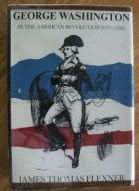

When at some future date the high court of history sits in judgment on each one of us—recording whether in our brief span of service we fulfilled our responsibilities
to the state—our success or failure, in whatever office we may hold, will be measured by the answers to four questions—were we truly men of courage … were we truly men of judgment … were we truly men of integrity … were we truly men of dedication?
John F. Kennedy, As president-elect, to Massachusetts legislature, NY Times 10 Jan 61
Simpson's Quotations at Bartleby.com
History of President's Day
"The original version of the holiday was in commemoration of George Washington's birthday in 1796 (the last full year of his presidency). Washington, according to the calendar that has been used since at least the mid-18th century, was born on February 22, 1732. According to the old style calendar in use back then, however, he was born on February 11. At least in 1796, many Americans celebrated his birthday on the 22nd while others marked the occasion on the 11th instead. By the early 19th century, Washington's Birthday had taken firm root in the American experience as a bona fide national holiday. Its traditions included Birthnight Balls in various regions, speeches and receptions given by prominent public figures, and a lot of revelry in taverns throughout the land. Then along came Abraham Lincoln, another revered president and fellow February baby (born on the 12th of the month). The first formal observance of his birthday took place in 1865, the year after his assassination, when both houses of Congress gathered for a memorial address. While Lincoln's Birthday did not become a federal holiday like George Washington's, it did become a legal holiday in several states. In 1968, legislation (HR 15951) was enacted that affected several federal holidays. One of these was Washington's Birthday, the observation of which was shifted to the third Monday in February each year whether or not it fell on the 22nd. This act, which took effect in 1971, was designed to simplify the yearly calendar of holidays and give federal employees some standard three-day weekends in the process. Apparently, while the holiday in February is still officially known as Washington's Birthday (at least according to the Office of Personnel Management), it has become popularly (and, perhaps in some cases at the state level, legally) known as "President's Day." This has made the third Monday in February a day for honoring both Washington and Lincoln, as well as all the other men who have served as president."
History of President's Day--Miami Dade County Public Schools
List of the Presidents of the United States at Wikipedia
Top Five Books on American Presidents at About.com
Personally Recommended:
Editorial Reviews
Amazon.com
This is the consummate guide to the political and personal lives of every U. S. president through Bill Clinton. Arranged chronologically, The Complete Book of U.S. Presidents elaborates not only on the major accomplishments and events of their terms, but also on less well-known details such as personalities, careers before the presidency, Supreme Court appointments, hobbies, ethnic backgrounds, and even extramarital affairs. Well-organized and packed with details, the book also includes a bibliography on each executive, including books written by and about them, along with useful and entertaining appendixes on the political composition of every Congress, presidential curiosities (such as the uncanny similarities between the
 lives and deaths of Abraham Lincoln and John F. Kennedy), and a ranking of presidents. Whether you want to know the opponent of James Monroe in the election of 1816 or read some of Harry S. Truman's more memorable quotes, this is a most complete and thorough reference to each commander in chief. --This text refers to the Hardcover edition.
lives and deaths of Abraham Lincoln and John F. Kennedy), and a ranking of presidents. Whether you want to know the opponent of James Monroe in the election of 1816 or read some of Harry S. Truman's more memorable quotes, this is a most complete and thorough reference to each commander in chief. --This text refers to the Hardcover edition.From Library Journal
This work has been updated to include President Reagan's second term and a new entry for George Bush. When the first edition appeared, LJ' s reviewer called it a "ready-reference tool that fleshes out the bare bones of the standard Facts About the Presidents" (LJ 3/1/84). It provides summaries of the subjects' political careers, descriptions of key events and people associated with them, and personality sketches and anecdotes. Academic and public libraries should consider.
- Francine Fialkoff, "Library Journal"
This is part four of a four-volume series of George Washington's life and this final installment is the strongest book of all. Flexner's narrative takes the reader up to Washington's last breath and his description of his death is particularly interesting. Despite the fact that there is a plethora of interesting material on Washington's ilness and death, this book brings out facts hitherto unknown. It is reliable and accurate, but one sometimes yearns for a more enlightened and exciting presentation of the earlier years. This is the

personification of how history is usually taught: in a manner not designed to capture the reader or the student.
One strong point is that Flexner successfully presents a balanced portrait of Washington. Any bias from the author is thankfully masked from the reader. When Washington deserves criticism or censure, the author soberly dispenses it. Praise and plaudits are similarly given. If you are deeply interested in Washington's early years, this is an adequate and trustworthy source. But if you are merely dabbling in Washington and prefer a swifter narrative, then this is not a recommended selection.
Candace Scott at Amazon

Editorial Reviews
Amazon.com
Someone once said that more books have been written about Abraham Lincoln than any other person in history save Jesus and Shakespeare. Indeed, it is impossible to understand the Civil War without getting to know the complex figure of the 16th president. More than any other biographer, Stephen B. Oates brings the plain-talking man from Illinois to life as a canny politician, a doting husband, and a determined wartime leader. Oates has an appealing appreciation for Lincoln's majestic control of the English language, his raw humor, and his undeniable heroism. The final pages, covering Lincoln's death and his legacy, are graceful and moving.
Book Description
A masterful biography of Lincoln that follows his bitter struggle with poverty, his self-made success in business and law, his early disappointing political career, and his leadership as President during one of America's most tumultuous periods.
You may burn my body to ashes, and scatter them to the winds of heaven; you may drag my soul down to the regions of darkness and despair to be tormented forever; but you will never get me
to support a measure which I believe to be wrong, although by doing so I may accomplish that which I believe to be right.
Abraham Lincoln
Respectfully Quoted: A Dictionary of Quotations at Bartleby.com
Happy Reading
© Bob Hoff, 2007

No comments:
Post a Comment